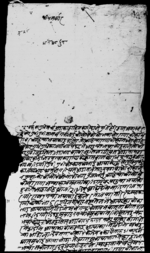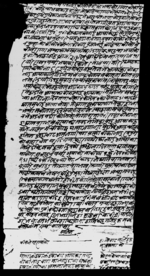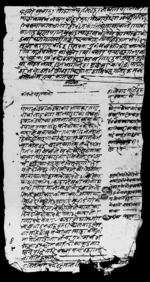A purjī from Prime Minister Bīra Śamśera to the Guṭhī Kharca Aḍḍā rejecting the purchase of fodder for he-goats and he-buffaloes (VS 1948)
ID: K_0402_0058
Edited and
translated by Astrid Zotter
in collaboration with
Pabitra Bajracharya
Created: 2020-08-12;
Last modified: 2022-02-28
For the metadata of the document, click here
The accompanying edition, translation/synopsis and/or commentary are available under the terms of the Creative Commons Attribution-ShareAlike 4.0 International License
Abstract
With this purjī Prime Minister Bīra Śamśera Jaṅga Bahādura Rāṇā rejects an appeal from the Guṭhī Kharca Aḍḍā to institutionalize the purchase of fodder for he-goats and he-buffaloes kept at the office prior to being used in rituals of various trusts (guṭhīs).Diplomatic edition
[1r-part1]
1श्री\1श्री५सर्कार2१1⟪नं२८⟫1⟪हानं २८९न⟫[Seal with the legend: [?]][Unknown seal][Unknown seal]1¯ ¯१¯तर्फकागुठिषर्चअडाकाहाकिम्कारिन्दालेपुर्जिहेरिहालअमानतर∙
2हेकोगुठीगुठीमाषर्चगर्नालाईचोषोवेचोषोभयाकोरागावोकाव
3रावरचाहिन्याभयाकाहुनालेर∙सोचाहिन्यारागावोकामध्येकेहि
4[...]कागुठिगुठिकाजगावाटपैदाभैआउन्याभयाकोहुनालेसोवो
5कागुठीतहसिलअडावाटवरावरतहसिलगरियसअडामापठा
6[...]कोवुझिलिनपुग्याकारागावोकासवालकोरीतपुर्याइवजार∙
7वाटषरीदगरिगुठीगुठी∙कोकामचलाईआयाकोछसोगुठिगुठी
8काजगावाटअसुलगरीयसअडामावुझाउनपठायाकोवोकाले
9नपुग्या∙कोचोषोवेचोषोवोकारपुजालाईचाहिन्याचोषोवे
10चोषोरागाभन्याकावषतमाषरीदगर्ननपाउन्याभयाको
11हुनालेजाहातहिषोजी२।३दिनअघिदेषिषरीदगरीतय़ा
12रगरिराषनुपर्न्याभयाकाहुनालेरसोतयारगरिराष्याका
13रागावोकालाइरगुठिजगावाटतहसिलभैआयाकावोका
14लाइआयाकामितिदेषिषर्चगर्न्यावेलानभयासम्मघासपरा
15लषरीदगरिदिनहुषुव़ाउनपर्न्यानषुव़ायामरीनोक्सानहुन्या
16भयाकोहुनालेतहसिलअडावाटवुझाउनपठायाकोमामंसि
17रमैन्हादेषिआयाकावोकालाइआयाकामितिदेषिषर्चहु
18न्याअघिलादिनसम्मवोका१केदिन१कोपैसारुऽ।कादर्ले
19घासषुवाईआय़ाकोछु∙सोघासषुव़ायाकामिन्हाहोला
20भंन्य़ासव़ालसनदनभयाकोहुनालेस्याहामाषर्चलेषन∙
[1r-part2]
21नभैअडवडपर्दारकौसितोसाषानामापनीरागावोकाला
22इ∙घासपरालषुव़ायाकोसनदभैमिन्हापाईआयाकाहु
23नाले∙जाहेरगर्याकोछुयस्माजगावाटपैदाभैआउन्यात
24हसिलअडावाटअसुलगरिपठाय़ाकोवोकालाइरनपुगे
25कोवजारवाटषरीदगर्याकारागावोकालाईआयाका∙
26मितिदेषिषर्चहुन्यादिनकोअघिलादिनसम्मघासषुवा
27याकोरषुव़ाउनुपर्न्याभयाकोमावोका१केदिन१कोपैसा
28रुऽ।रागा१केदिन१कोपैरु/कादरलेघासपरालषरी∙
29दगरिषुव़ाउनुसोघासपरालषरीदगरिषुव़ायाकादाम्
30स्याहामाषर्चलेषनुवहिवुझडामोजराहोलाभंन्यासनदग
31रीवक्स्याकामचलदोहोनीजकौसितोसाषानालेरागावो
32कालाइघासपरालषुव़ाइस्याहाषर्चलेषेकोस्याहाको
33उतारयसैमागासीजाहेरगर्याकोछुजोमर्जिहुकुम्भनी४७
34सालफागुणवदि६रोज१मागुठीषर्चअडावाटचढायाको
35रपोटमातपसिलकोवेहोरागरीवक्सनुपर्न्याठहराञ्यूभनि
36¯ ¯१¯तर्फकागुठीवन्दोवस्तअडाकाषरीदारदुर्गाप्रसादमुषि
37यामोहनलाल्राजभडारीलेहाम्राहजुरमावीन्तीपार्दाजा
38हेरभयोतसर्थसोठहरायाकोमाहामीवाटमर्जिहुकुम्वक्से
39वमोजीमगर्न्याकामगर————
[1r-part3]
[Unknown seal][Seal with the legend: चिरंजीवी][Seal with the legend: श्रीराँम]40
[table1]
| 1 | चीत्तलेठहरायाको | हामिवाटमर्जिहुकु म्वक्स्याको |
| 2 | ———————————————— | —————————— |
| 3 | येस्माजील्लाजील्लावाटआयाकारागा वोकालाइवाटामाल्याउदाकोषर्चजी ल्लाजील्लाकाअमलालेपाइआयाकोर नेपालपुग्यापछिपनिवोका१केपैरुऽ॥ कादरलेषुव़ायाकोररागाषरीदभैज्माभै रहेकोकसाइकानाउमाघासपरालकेभं न्यास्मेत४६सालकार्तिकसुदि१४।१५ रोज५माषर्चलेषेकोकौसितोसाषा नाकास्याहाकाउतारदेषिनालेगुठीष र्चअडाकानाउमापनिसनदगरिदिनु पर्नेदेषिन्छ∙सोदेषीनालेकौसितोसा षानाकास्याहामावोका१केऽ॥लेषिय़ा कोछतापनिऽ।कादरलेषुव़ायाकोछु भनीरपोटमालेषियाकोहुनालेतह सिलअडावाटजीम्मावारीआयाका मितिदेषिरतेसैअडावाटषरीदगरेको वोकाकोमोलविक्रीगर्नेलेपायाका दिनदेषिवोका१केपैसाऽ।कादरले∙र रागा१केपैसारु/कादरलेघासपरा लषुव़ाउनु∙वहिवुझदा∙मोलपाउन्या कासहिछाप्∙पर्याकास्याहावमोजी म्∙मोजराहोलाभंन्यागुठी∙षर्चअ डाकाहाकीम्कारीन्दाकानाउमा२ छापेपुर्जिगरि∙वक्सनुपर्न्याठहराञ्यू जोमर्जिहुकुम्∙———— ——————- | सोरागावोकालाईघा सषरीदगरीषुवाउनु[...] र्दैनतेसअडाकादरिया कासिपाहीहरुलाइ[...] गाईपालनुलाउनु [?]८ साल[?]वदी३ रोज३शु———— |
| 4 | मुलुकीअडालेवोलेको यस्मागुठीवन्दोवस्तअडा लेठहरायाकोमुतावीक रहेछभन्याहाम्राचीत्मा[...] ग्छजोमर्जिहुकुम्—————– गोकाजिलक्ष्मीभक्तउ पाध्या—————–१[...] मुषीयाविन्दुरत्न—————–१ |
41इतिसम्वत्१९४८साल[...]
Translation
[1r-part1]
Śrī 5 Sarkāra – 1
No. 28
hā naṃ 28, 9 na1
[Seal with the legend: Śrī Bīra Samsera Jaṅga Rāṇā]2
[Unknown seal]
[Unknown seal]
The chief and clerks of the Guṭhī Kharca Aḍḍā under [Śrī 5 Sarkāra]3 [wrote] with respect to [this] purjī: "In the different guṭhīs that currently run under governmental management (amānata) he-buffaloes and he-goats, both pure [and] impure (?),4 are needed from time to time in order to expend [them]; and as among the he-buffaloes and he-goats needed some he-goats have traditionally been raised on land [under the control] of the different guṭhīs; and as from time to time these he-goats have been sent to our (lit. "this") office after being requisitioned by the Guṭhī Tahasila Aḍḍā; and as the rituals of the guṭhīs have traditionally been carried out after buying sufficient (pugyākā) he-buffaloes and he-goats in the market, thereby adhering to the customary procedure [fixed in] directives (savāla); and as the he-goats that were collected from the land of these guṭhīs and sent to our office for inspection were not sufficient in terms of pure and impure he-goats [needed]; and as pure and impure he-buffaloes were not available for sale at the time when [it was] said they were needed; and as one had to search here and there and had to buy [them] 2 to 3 days in advance and keep them ready; and as I have been giving purchased grass and rice straw to these he-buffaloes and he-goats kept in readiness and to the he-goats that were requisitioned from the guṭhī lands, having to feed them from the date they arrived until the time they were expended—because if [they] are not fed [they] die and there would be loss—I have come to feed grass [purchased] at the rate of 0|1 paisārupaiyā̃ (i.e. 1 paisā?) for 1 day for 1 he-goat to [those] that had come from the month of Maṃsira on in the process of being sent for inspection from the Tahasila Aḍḍā, from the day they arrived to the day prior to being expended. As there is no savāla or sanada stating that [the expenses for] feeding this grass will be reimbursed; and as a misbalace occurs if the expenses are not recorded in the account book;
[1r-part2]
and as the Kausī Tosākhānā, too, has traditionally received a reimbursement, having had a sanada [issued] for feeding grass and rice straw to he-buffaloes and he-goats, I have brought [this matter] to [your] notice. The task of having a sanada issued is going forward, as follows: 'As it is the case that grass has been fed and needs to be fed to he-goats which come after being raised on [guṭhī] land and are collected and sent through the Tahasila Aḍḍā, and he-buffaloes and he-goats which have been bought in the market when [their numbers] were [otherwise] insufficient—from the date they arrive [at the Guṭhī Kharca Aḍḍā] to the day prior to being expended—buy and feed grass and rice straw at the rate of 1 [paisā] in pairus per he-goat per day and at the rate of 1 [ānā] in pairus per he-buffalo per day. Write the price of this grass and rice straw that has been bought and fed into the account book. It will be reimbursed when accounts are cleared.' I have enclosed a copy of the account book in which the aforementioned Kausī Tosākhānā has accounted for feeding grass and rice straw to he-buffaloes and he-goats and bring [it] to [your] notice. Whatever [is your] wish [is our] order." This came to our notice when the kharidāra of the Guṭhī Bandobasta Aḍḍā under [Śrī 5 Sarkāra], Durgāprasāda, and its mukhiyā, Mohanalāla Rājabhaḍārī, made petition to us stating: "We have ascertained [a sanada] needs to be issued,5 [wherein] are stated the details given in the particulars (tapasila) [below] with respect to the report [quoted above] submitted by the Guṭhī Kharca Aḍḍā on Sunday, the 6th of the dark fortnight of Phālguna in the [Vikrama era] year [19]47." Therefore, act in accordance with what we have ordered [below] in view of what has been determined here.
[1r-part3]
[Unknown seal]
[Seal with the legend: Ciraṃjīvī]6
[Seal with the legend: Śrī Rā̃ma]
[table1]
| Determined by way of a note7 | Our wish and order8 | |
| In view of the copy of the account book (syāhā) of the Kausī Tosākhānā with expenses for grass and rice straw accounted for in the names of the Kasāīs on Thursday, the 14th/15th of the bright fortnight of Kārttika—for that which summed up to expenses [incurred] when herding the he-buffaloes and he-goats that came to this [office] from the different districts (jillās),9 for that which was traditionally received by the revenue collection offices (amāla) of the different jillās, and also for that [purchased] after [the animals] arrived in Nepāla10 at the rate of 2 [paisās] in pairus per he-goat and for the he-buffaloes that were bought—it appears that in the name of the Guṭhī Kharca Aḍḍā, too, a [similar] sanada needs to be issued. We have determined that a purjī with two seals11 needs to be issued in the name of the chief and clerks of the Guṭhī Kharca Aḍḍā saying: "In view of the fact that it has been written in the report: 'I have fed [the he-goats with grass purchased] at the rate of 1 [paisā] in pairus, even if in the account book of the Kausī Tosākhānā for 1 he-goat 2 [paisās] in pairus has been written,' feed grass and rice straw at the rate of 1 [paisā] in pairus per he-goat and at the rate of 1 [ānā] in pairus per he-buffalo from the date they arrive [at your office] from their custody in the Tahasila Aḍḍā [or] from the day they are received by those in charge of the acquisition in the case of the he-goats that are bought. When accounts are cleared, it will be deducted according to the account book bearing the seal and signature of those who have received the amount." Whatever [is your] wish [is our] order. | These buffaloes and goats do not have to be fed grass and rice straw. Appoint attendants (sipāhī) of your office and let them herd [the animals]. Tuesday, the third of the dark fortnight of ...12 of the [Vikrama era] year [19]48. | |
| Spoken by the Mulukī Aḍḍā: In our view it seems
that13
what the Guṭhī Bandobasta has determined in this matter is justified. What
[the Prime Minister's] wish is is the order [to be obeyed]. KājīLakṣmībhakta Upādhyā – 1 Mukhiyā Binduratna |
.... in the [Vikrama] era year 1948 (1891 CE).
Commentary
The present document bears testimony to a failed attempt by the Guṭhī Kharca Aḍḍā to get a sanada that would have allowed them to buy food for sacrificial animals kept at their office. It is a purjī by the prime minister that quotes the original appeal by the Guṭhī Kharca Aḍḍā in the form of a report submitted through the Guṭhī Bandobasta Aḍḍā. In it the Guṭhī Kharca Aḍḍā had explained the reasons why it had come to keep and feed the animals—pooled in the office after being either sent from the Guṭhī Tahasila Aḍḍā for inspection or bought in the market a few days in advance of the time they were to be used by different guṭhīs—and referred to the similar practice of buying food for sacrificial animals through the Kausī Tosākhānā. The tapasila contains a determination, probably by the Guṭhī Bandobasta Aḍḍā, of what should be sanctioned by a possible sanada. To its left the justness of the claim is verified by the Mulukī Aḍḍā, so that it seems that the document had either been prepared in this office or at least went through it for endorsement. Then, quite surprisingly, the appeal is rejected by a short note written by the prime minister in the right column above the Mulukī Aḍḍā's endorsement, with the advice to have attendants of the Guṭhī Kharca Aḍḍā herd the animals rather than to buy food. The question of whether the expenses for the fodder that had already been consumed over the last few months would be reimbursed is left open, however.
The document shows how even seemingly minor issues, such as a decision to buy food for animals, could not be handled directly by the office concerned, but had to go through a long bureaucratic process with reports prepared, submitted, verified, quoted by still other officials and passed on through various offices up to the highest level. It also attests to the fact that such paperwork was not just a formality, but could fail in the last instance, even if—as in the present case—all offices along the way supported the request.



